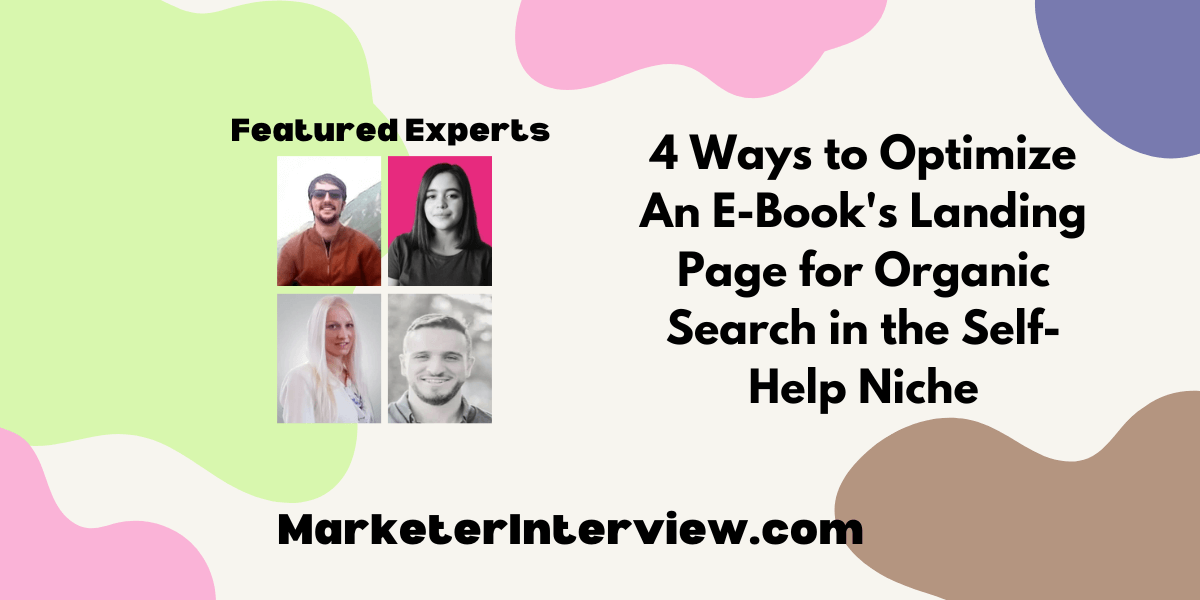4 Ways to Optimize An E-Book’s Landing Page for Organic Search in the Self-Help Niche
In the crowded digital landscape of the self-help niche, optimizing an e-book’s landing page for organic search is crucial. We’ve gathered insights from top marketing professionals, including a General Manager and a Marketing Manager, to bring you four specific strategies. From integrating high-traffic keywords to targeting long-tail keywords for specificity, these are the expert approaches to help your e-book stand out.
Want to get quoted in MarketerInterview.com content just like this? Apply to become a contributor today!
Contents
Integrate High-Traffic Keywords
To optimize an e-book’s landing page for organic search in the self-help niche, focus on keyword-rich, engaging content, and on-page SEO elements. Start by conducting thorough keyword research to identify high-traffic, low-competition keywords relevant to your e-book’s topic. Integrate these keywords naturally throughout the landing page, including in the title, headings, meta description, and body content.
Create a compelling and keyword-optimized title that captures the essence of your e-book and appeals to search intent. Ensure your meta description is concise, persuasive, and includes primary keywords to improve click-through rates from search engine results pages (SERPs).
Enhance the content with value-driven elements like bullet points, testimonials, and key takeaways to make it informative and engaging. Incorporate internal links to related content on your site and external links to reputable sources to boost the page’s authority. Use high-quality images and optimize them with alt text that includes relevant keywords.
Implement technical SEO best practices by ensuring the page loads quickly, is mobile-friendly, and has a clear, user-friendly layout. Use schema markup to provide search engines with structured data about your e-book, enhancing its visibility in SERPs.
Lastly, promote the landing page through your social media channels and email newsletters to generate initial traffic and engagement, further boosting its organic search performance. By combining these strategies, you can create a highly optimized landing page that attracts organic traffic and drives e-book downloads in the self-help niche.

Omer Lewinsohn, General Manager, Marketing Expert, Management.org
Balance Technical SEO with Engaging Content
When optimizing a landing page for an e-book in the self-help niche, it is crucial to balance technical SEO elements with engaging content that resonates with the target audience. Here is my specific approach to achieve this:
Keyword Research and Implementation
Begin with thorough keyword research. Identify long-tail keywords relevant to the self-help niche, focusing on phrases potential readers might use. Tools like Ahrefs, SEMrush, or Google’s Keyword Planner can provide insights into search volume and competition. Once identified, strategically place these keywords in critical areas of the landing page, including the title tag, meta description, headers (H1, H2, H3), and throughout the content. However, avoid keyword stuffing; the content should read naturally and provide value to the reader.
High-Quality Content
The cornerstone of any successful landing page is high-quality content. Start with a compelling headline that grabs attention and clearly conveys the benefit of the e-book. Follow this with a persuasive introduction that addresses the pain points of your target audience and how your e-book provides solutions. Use testimonials, case studies, and success stories to build credibility and trust. Ensure the content is well-organized, easy to read, and includes bullet points or numbered lists for better readability.
On-Page SEO Elements
Optimize on-page elements to improve search engine visibility. Ensure your URL is clean and includes the primary keyword. Use descriptive alt texts for images, and consider adding a video overview of the e-book to increase engagement and time on page.
Mobile Optimization
Use responsive design techniques to make sure the page adapts seamlessly to different screen sizes. Google’s Mobile-Friendly Test tool can help identify any issues that need addressing.
User Experience and Load Speed
A fast-loading page improves user experience and can positively impact your SEO rankings. Use tools like Google PageSpeed Insights to analyze your page speed and implement recommended improvements. Compress images, leverage browser caching, and minimize JavaScript to enhance load times.
Call-to-Action (CTA)
Finally, a clear and compelling call-to-action is vital. Make sure the CTA stands out visually and clearly instructs the visitor on the next step, whether it’s downloading a free chapter, signing up for a newsletter, or purchasing the e-book.
I hope these tips will help.

Piergiorgio Zotti, SEO Specialist Senior – AI & SEO Trainer, Corso Intelligenza Artificiale
Conduct Thorough Keyword Research
Start by conducting thorough keyword research. Use tools like Google Keyword Planner (free) or Ahrefs/SEMrush (paid) to find keywords with high search volumes. Add these keywords into the page’s meta tags, headings, and body content as naturally as possible to avoid keyword stuffing. Make the navigation user-friendly, answer the most frequently asked questions, add clear calls-to-action, and include testimonials.

Roxana Motoc, Head of Marketing, SocialBee
Target Long-Tail Keywords for Specificity
I remember when I launched my first e-book on self-improvement; I was so excited to share my knowledge with the world. But then reality hit – how was I going to get people to actually find my book amidst the vast sea of online content? That’s when I discovered the power of optimizing my landing page for organic search.
One approach that worked wonders for me was focusing on long-tail keywords. Instead of targeting broad terms like “self-help e-book,” I honed in on more specific phrases like “how to overcome procrastination and achieve your goals” or “practical tips for managing anxiety and stress.” These longer, more targeted keywords may have lower search volume, but they attract a more qualified audience who are actively searching for solutions to their specific problems.
I made sure to include these keywords strategically throughout my landing page, including in the title, meta description, headers, and body copy. I also focused on creating high-quality, informative content that genuinely addressed the needs of my target audience.

Liga Rudzite, Marketing Manager, Lemon Pitch
Want to get quoted in MarketerInterview.com content just like this? Apply to become a contributor today!






